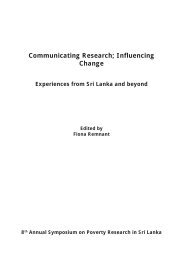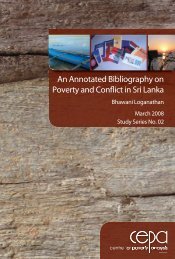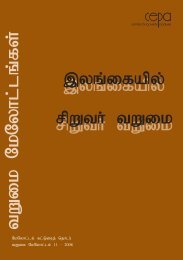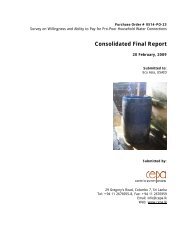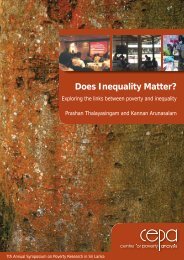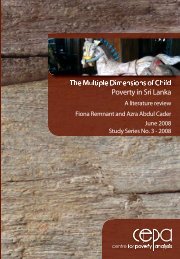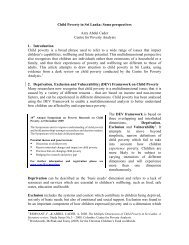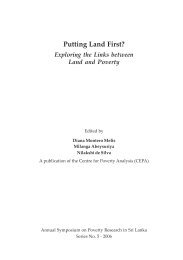Involuntary Displacement and Resettlement â Policy and ... - CEPA
Involuntary Displacement and Resettlement â Policy and ... - CEPA
Involuntary Displacement and Resettlement â Policy and ... - CEPA
- No tags were found...
You also want an ePaper? Increase the reach of your titles
YUMPU automatically turns print PDFs into web optimized ePapers that Google loves.
With respect to the transparency of communication <strong>and</strong> access toinformation, tsunami-affected families found it unclear how theirnames were placed on either a list for a donor-driven house or a listfor self-settlement.Finally, there must be full disclosure to individuals/families that areexcluded or rejected from compensation in general, or specificschemes in particular, so that they fully underst<strong>and</strong> why they havebeen denied. Families who are denied assistance should be treatedwith respect rather than threatened or coerced to leave shelter sitesby cutting off essential services (e.g., water <strong>and</strong> electricity).Accountability: While private <strong>and</strong> non-profit humanitarian agenciesmight provide financial <strong>and</strong> other types of assistance forresettlement, it is ultimately the responsibility of the localgovernment administration to see that all families complete theresettlement process. The government must be held accountablefor resettling all of its citizens affected by disaster.Longitudinal Research: In the context of large-scale, natural orman-made disaster, donor agencies should fund longitudinalresearch through well-established research institutions. The generalpractice has been for donors 19to fund small, one-off studiesthrough NGOs. Normally these NGOs do not have social scientificexpertise, <strong>and</strong> undertake the ‘study’ as one of the many activities intheir portfolio. As these studies are not coordinated <strong>and</strong> employdifferent sampling frames, questionnaire results are notcomparable. Also, as these studies are ‘one-off’ there is nocomprehensive database to track changes <strong>and</strong> enable analysis thatwill systematically document trends across time <strong>and</strong> provideadditional knowledge. Longitudinal research should be bothquantitative <strong>and</strong> qualitative in nature so that statistics arecontextualised <strong>and</strong> exceptions/unique cases can be explained.19One exception to this was the Needs Assessment for Income Recovery (NASIR) studies thatwere commissioned by the International Labour Organization’s Income Recovery TechnicalAssistance Program (ILO-IRTAP). ILO-IRTAP commissioned three studies over a three-yearperiod always using the same local firm <strong>and</strong> international consultant. This approach allowed forcontinuity between the reports as well as institutional memory about survey conceptualization<strong>and</strong> design.203



